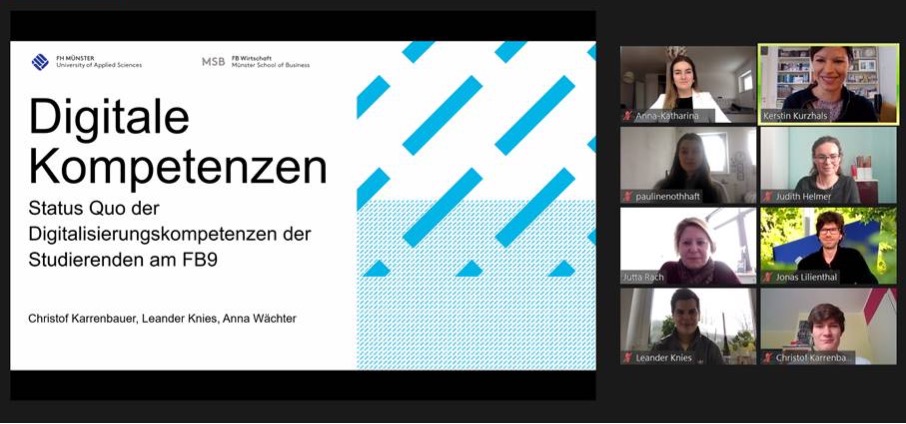9 February 2021 | Münster
How are the digital competences of students changing and evolving due to the "pushed digitalization" in times of Covid-19? What are the new requirements and challenges for education, if these new competences are to be specifically trained?
In times of a pandemic, where working and studying from home has become part of everyday life, digital tools and digital competences are becoming more and more important. Together with the project leader Dr. Kerstin Kurzhals, three bachelor students of the Strategic Marketing module conducted a study on "Digital Competences of Students". The project was carried out for the dean`s office of the Münster School of Business (MSB) and implemented in a cross-disciplinary cooperation with Wandelwerk (Dr. Jonas Lilienthal), the MSB Quality Management (Thorsten Zdebel) and the Science-to-Business Marketing Research Centre (Judith Helmer, Dr. Kerstin Kurzhals).

The aim of the study was to develop a status quo report of the digital competences of bachelor students at the MSB. In 2019, the Digitization WG has already conducted an initial survey among students on their digital competences. By comparing the data, this year's study allowed conclusions to be drawn on changes in students' digital competences due to the "pushed digitalization" since the Covid-19 pandemic. On this basis, the students were able to present the development and current level of digital competences in the bachelor's degree programs in Business Administration, EBP, and CALA and gave recommendations for teaching to anchor these cross-disciplinary digital competences much stronger in curricula of the bachelor's degree programs in the future.
The survey can roughly be divided into two subjects:
- Current knowledge and competences in digitalisation in relation to the student's studies at MSB and future professional life.
- Assessing current digital implementation of the lectures comparing before and during the pandemic, as well as a future outlook of teaching.
The data provided very interesting insights into the current state of digitization and changes in the digital competences of students at MSB. The assumption that the digitization push leads to a significantly changed requirement profile for students was confirmed. Thus, 95% of the respondents confirm an increased requirement for digital competences due to the pandemic. The survey revealed that new digital competences have emerged which should also find a strong anchoring in teaching. Additionally, 75% confirmed that their personal digital competences have increased as a result of the new requirements. The survey also provided interesting insights into the extent to which teaching at the MSB can already address these changed requirements today and in the future. Thus, special emphasis was given on the education and training of digital tools, which still have a high usage potential also regarding the professional entrance after finishing one's studies at the MSB. Therefore, Covid-19 can be seen as an opportunity to expand this in the near future, especially in terms of digital brainstorming tools, digital presentation tools, digital project management tools and digital whiteboards.
Being asked for their vision for the future of teaching, one of the main results was that a hybrid teaching format would also appeal in the future, as almost all participants were in favour of a flexible online-offline format (44%) or an offline format with the support of digital tools (40%). The experiences currently made in the context of digital teaching will therefore continue to find a broad field of application in the future and will flow into the long-term digitization of teaching. Nonetheless, there was also an ideal vision of what online teaching should look like: Live lectures (i.e., synchronous formats) slightly outweighed e-lectures (asynchronous formats) with 58%, this is also in line with MSB's identity, which will continue to see itself as a university of attendance while also making use of the facilitating benefits of digital tools in the future.
It is planned to continue the study after the pandemic to allow a time series analysis in order to follow the development of digital competences before, during and after the pandemic.


